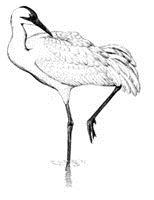North American Crane Working Group

Proceedings of the North American Crane Workshop
Date of this Version
2005
Document Type
Article
Citation
Ellis, D.H. Past, present, and hypothetical methods for crane reintroduction and migration. In Chavez-Ramirez, F, ed. 2005. Proceedings of the Ninth North American Crane Workshop, Jan 17-20, 2003. Sacramento, California: North American Crane Working Group. Pp. 197-202.
Abstract
In the early 1980’s the technique of releasing yearling parent-reared cranes was perfected with the Mississippi sandhill crane (Grus canadensis pulla). In the late 1980’s, we discovered that hand-reared yearlings could also be released with good expectation of survival in both migratory and nonmigratory situations. In the mid-1990’s, efforts expanded in many directions including (1) the use of various types of motorized vehicles to lead migrations, (2) the release of juveniles one by one into wild flocks in autumn or winter, and (3) the release of adult pairs. Here I outline new and proven techniques and those likely important in future reintroduction and migration projects.
Included in
Behavior and Ethology Commons, Biodiversity Commons, Ornithology Commons, Population Biology Commons, Terrestrial and Aquatic Ecology Commons


Comments
Reproduced by permission of the NACWG.